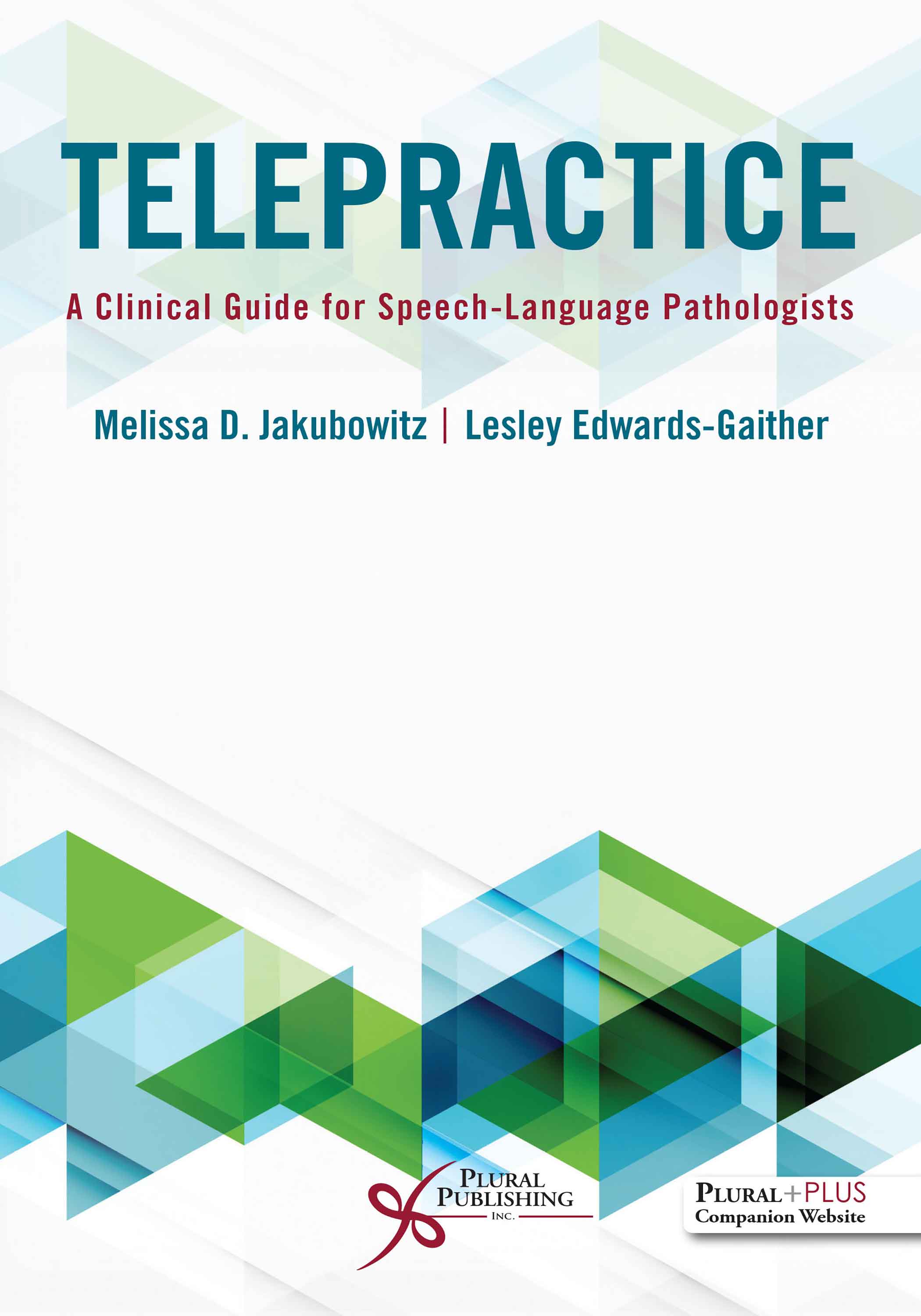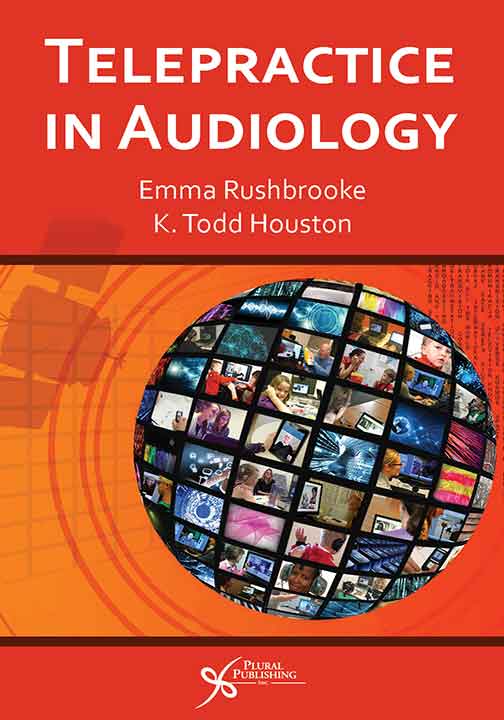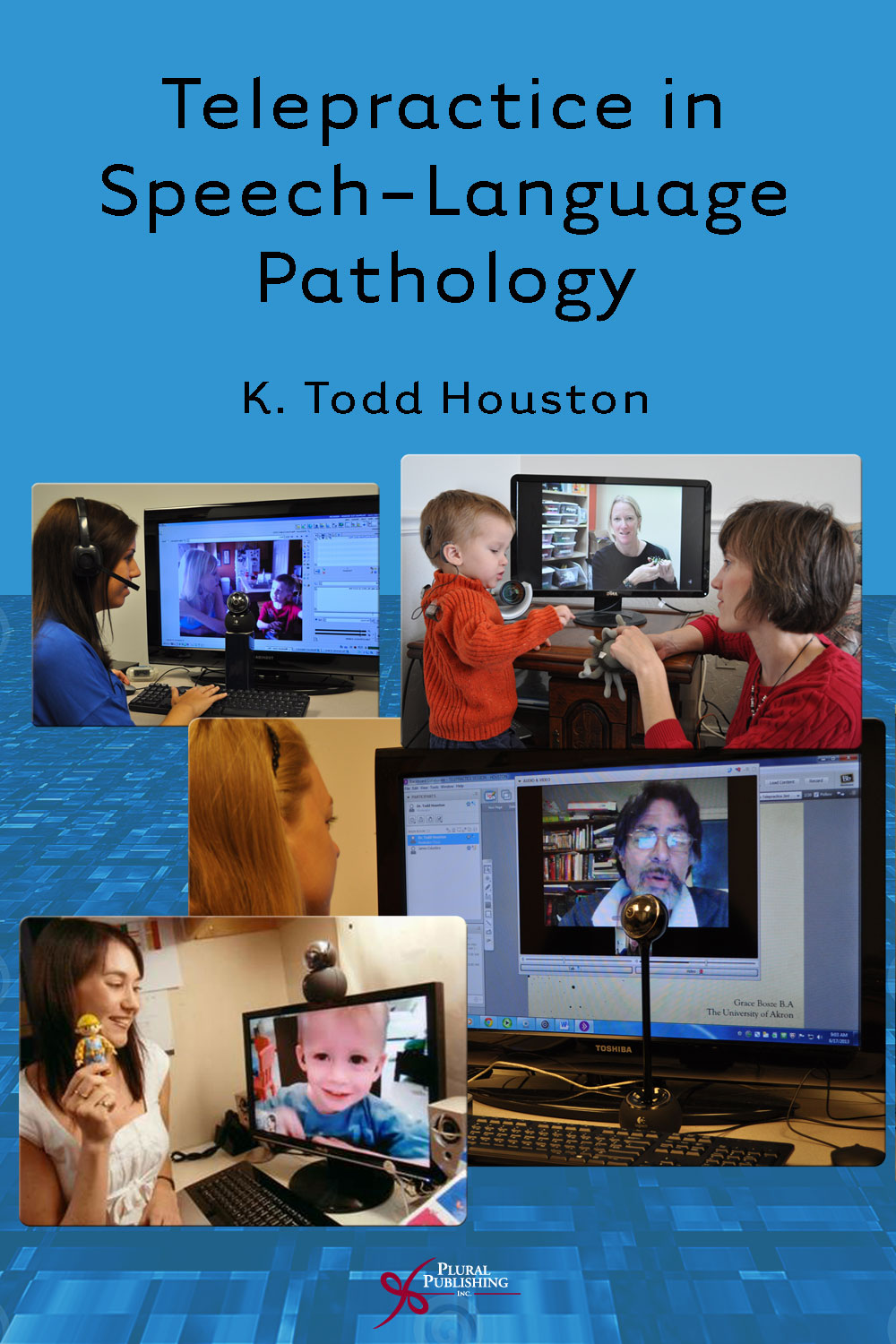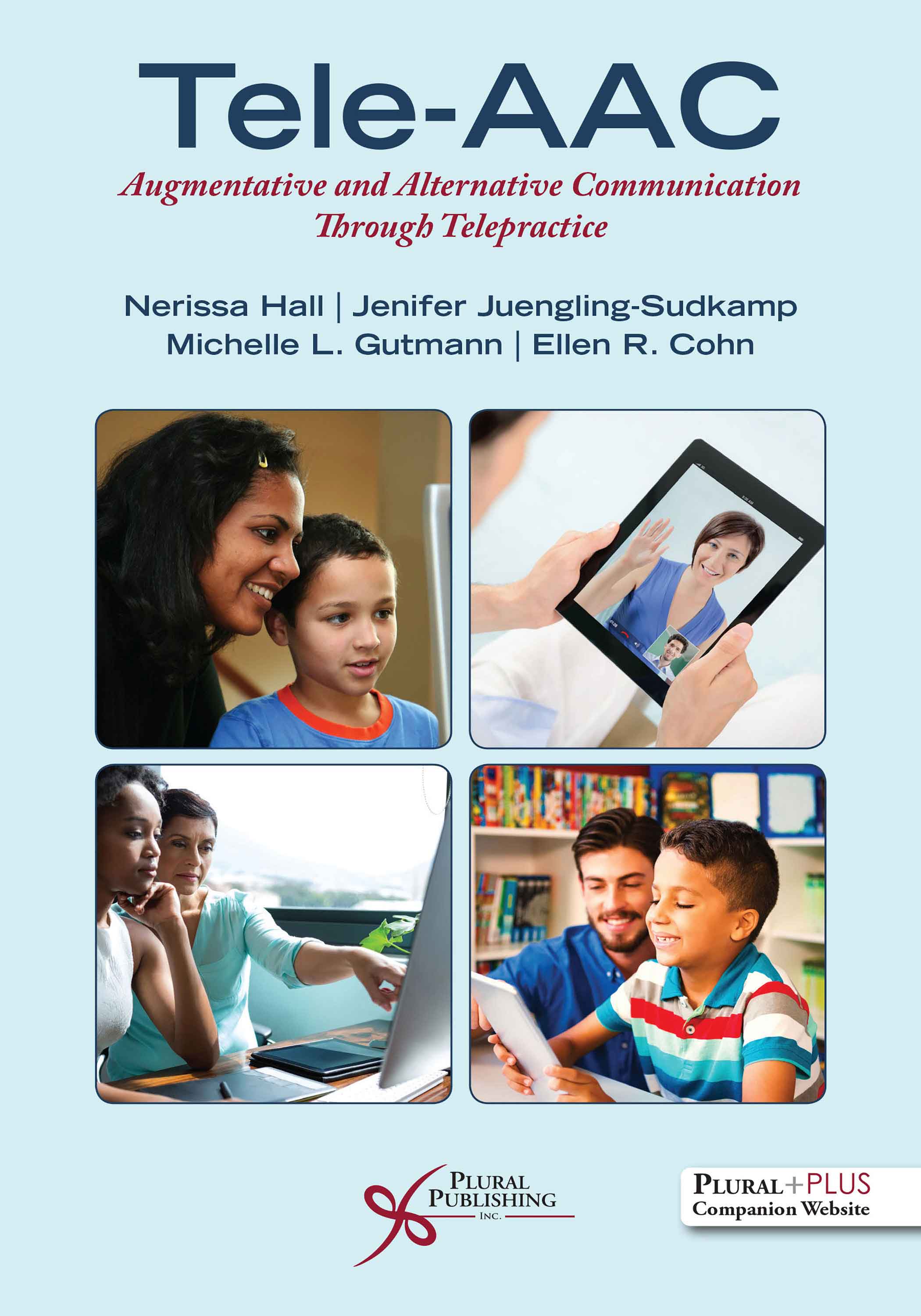
Telepractice: A Clinical Guide for Speech-Language Pathologists
First Edition
Melissa Jakubowitz, Lesley Edwards-Gaither
Details: 175 pages, B&W, Softcover, 6" x 9"
ISBN13: 978-1-63550-380-7
© 2022 | Available
For Instructors
Purchase
In an era of increased distance learning and digital services, Telepractice: A Clinical Guide for Speech-Language Pathologists offers speech-language pathologists (SLPs) the crucial information they need to provide successful telepractice services. Written with the viewpoint of post-COVID 19 application, this professional text includes everything SLPs need to know about telepractice and can assist both veteran and novice SLPs adjust to working via telepractice as the new normal.
Within this compact “how-to” guide, clinicians will find a range of valuable resources, including an overview of best evidence-based practices for teletherapy; specific therapeutic techniques and methods for engaging clients; a discussion of the cultural and linguistic considerations to keep in mind when assessing and treating clients via telepractice, and information on working with parents, teachers, paraprofessionals, eHelpers, and other facilitators. The authors also share their extensive experience and delve into the entrepreneurial aspects of telepractice to help clinicians building a teletherapy business to set themselves up for success.
Key Features
- Case scenarios representing clients at various ages, from early intervention through adulthood, that demonstrate client engagement
- Checklists, rubrics, models, and frameworks that will support the utilization of telepractice
- A simple business plan and a rate calculator, along with all the information necessary to be a successful telepractitioner
- A PluralPlus companion website with case scenarios and downloadable versions of practical resources
Reviews
"This book is an excellent resource! I learned so much-from the existence of The American Telemedicine Association and Telehealth Facilitator certificates, to the origins of online assessment, to details of public school contracting, to the upcoming ASLP-IC. Thank you! I thought I had a good knowledge base but this book filled in gaps I didn’t know were there. This book was well worth my time and I’m already putting it to use!"
–Sarah Zsak, MS, CCC-SLP
“This text provides speech-language pathologists with current, post-pandemic, evidence-based best practices to serve their clients in remote settings. The book includes a companion website that contains the charts, tables, and checklists illustrated within the book and two PowerPoint lectures… The seven chapters are well cited and review the history of telepractice, which has existed far longer than the pandemic. The authors provide information on current policy (2022) and the how-to of managing sessions with clients from technological and behavioral perspectives. In addition, a review of research and policy regarding both assessment and treatment are addressed, including discussions about cultural and linguistic factors. Several models for teletherapy and information to assist clinicians in evaluating apps and materials are provided. One chapter contains eight case scenarios ranging from early intervention to adulthood. These would be helpful to clinicians new to telepractice as the chapters describe the clients, goals, and strategies suggested for successful teletherapy sessions with the listed population, including critical thinking questions that may be helpful during instruction… This book gives a current overview of numerous aspects of telepractice and may be helpful both for current speech-language pathologists as well as undergraduate and graduate students. Because the book addresses policy, which is constantly changing, readers will need to evaluate what is current and relevant in their state. It is the most current text on telepractice available.”
–Suzanne M. Welty, MA, EdD, CCC, Biola University, fin Doody’s Reviews (July 2022)
"This book is a concise but informational text for successfully implementing telepractice services ethically and with evidence-based strategies. The authors define standard terms used in telepractice and have covered the key areas related to telepractice. Several case studies and critical thinking prompts walk readers through providing telepractice. The authors also acknowledge providing interventions for CLD individuals and low-incidence populations."
–Samantha Washington, EdD CCC-SLP
"...Written in language that can be easily understood by practicing clinicians without a research background. Good use of case studies. ...It was good to know the history of telepractice. It helps us see just how far we’ve come."
–Amber Heape, ClinScD, CCC-SLP, FNAP, CDP, CMDCP
Preface
Acknowledgements
Reviewers
Chapter 1. An Introduction to Telepractice
Telepractice Past and Present
History of Telepractice
Telepractice Terminology
Pandemic and Health-Emergency Implications
Resources
Resuming In-Person Services
Summary
References
Chapter 2. Technology
Internet Speeds
Computer Specifications
Headsets
Cameras
Videoconferencing Platforms
Service Delivery Models
Face-to-Face
Blended Learning
Hybrid
Hybrid Versus Blended Learning
Telepractice
Determining the Service Delivery Model That Best Suits the Client
Addressing Absenteeism
Future Directions
Strategies to Improve Telepractice Models
Future Directions in Telehealth
Artificial Intelligence
Speech Recognition
Ten Tips to Make Connections Using Technology
References
Chapter 3. Models of Service Delivery
Introduction
A Review of Literature and Telepractice Research
Client Candidacy
Apps and Websites
Cultural and Linguistic Considerations for Teletherapy
Culture and Technology
Preference for Digital Communication
Technology to Address Linguistic Considerations
References
Chapter 4. Assessments, Evaluations, and eHelpers
Introduction
Research and Evidence-Based Practice
Collaboration
Managing Technology
Parent Coaching
Training
Assessments and Evaluations
Set-Up for Successful Administration of Assessments
Standardized Assessment
Modifications
Report Writing
References
Chapter 5. Engaging Clients: Case Scenarios
Introduction
Case Scenario: Early Intervention
Background Information
Goals and Objectives
Telepractice Applications
Therapy and Materials
Challenges and Lessons Learned
Case Scenario: Preschool
Background Information
Telepractice Applications
Critical Thinking Questions
Case Scenario: Culturally and Linguistically Diverse Clients
Background Information
Telepractice Applications
Critical Thinking Questions
Case Scenario: Elementary
Background Information
Telepractice Applications
Critical Thinking Questions
K-12 Case Scenario: Group Language Intervention
Background Information
Telepractice Applications
Critical Thinking Questions
Case Scenario: Middle School
Background Information
Goals and Objectives
Telepractice Applications
Therapy and Materials
Challenges and Lessons Learned
Case Scenario: High School
Background Information
Goals and Objectives
Telepractice Applications
Therapy Materials
Challenges and Lessons Learned
Case Scenario: Adult
Background Information
Goals and Objectives
Telepractice Applications
Therapy Materials
Challenges and Lessons Learned
References
Chapter 6. Telepractice as a Business
Introduction
The Business Plan
Setting Therapy Rates
Marketing for Private Clients
Marketing to Schools
Setting Up for Success
Safety of Clients
References
Chapter 7. Confidentiality, Ethics and Legal/Regulatory Issues in Telepractice
Introduction
Code of Ethics
State Regulations
Licensure Compacts
The ASLP-IC:
Telepractice and Licensure Compacts
Telepractice Opportunities Related to the ASLP-IC:
Federal Legal and Regulatory Issues
References
Index
Purchase of Telepractice: A Clinical Guide for Speech-Language Pathologists comes with access to supplementary materials on a PluralPlus companion website.
The companion website is located at: https://www.pluralpublishing.com/publication/tcgslp
To access the student resources, you must register on the companion website and log in using the access code located in the front of your textbook.
*Note for students: If you have purchased this textbook used or have rented it, your access code will not work if it was already redeemed by the original buyer of the book. Plural Publishing does not offer replacement access codes for used or rented textbooks.

Telepractice in Audiology
First Edition
Emma Rushbrooke, K. Todd Houston
Details: 284 pages, B&W, Softcover, 6" x 9"
ISBN13: 978-1-59756-613-1
© 2016 | Available

Telepractice in Speech-Language Pathology
First Edition
K. Todd Houston
Details: 392 pages, B&W, Softcover, 6" x 9"
ISBN13: 978-1-59756-479-3
© 2014 | Available

Tele-AAC: Augmentative and Alternative Communication Through Telepractice
First Edition
Nerissa Hall, Jenifer Juengling-Sudkamp, Michelle L. Gutmann, Ellen R. Cohn
Details: 330 pages, B&W, Softcover, 6" x 9"
ISBN13: 978-1-63550-145-2
© 2020 | Available

Artificial Intelligence, Extended Reality, and Automation in Speech-Language Pathology: Integrating Technology Into Clinical Practice
First Edition
Michelle Boisvert, Nerissa Hall
Details: 368 pages, B&W, Softcover, 6" x 9"
ISBN13: 978-1-63550-770-6
© 2027 | Available


